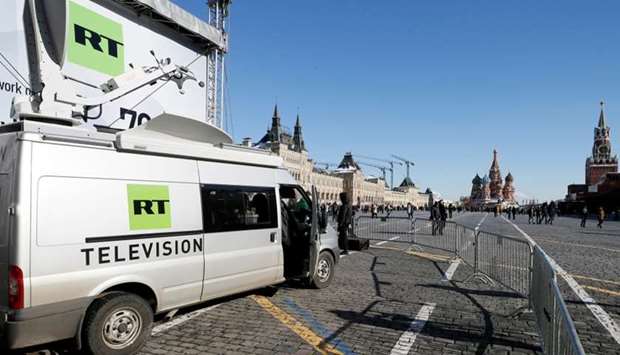* RT says fine is wrong and disproportionate
* Russia warns British media of consequences
Russia on Friday warned British media operating on its territory that they should be ready for consequences after Britain's media regulator fined the state-financed RT television channel over its coverage of the poisoning of former spy Sergei Skripal.
Relations between London and Moscow sank to a post-Cold War low over the 2018 poisoning of Skripal, a mole who betrayed hundreds of Russian agents to Britain's MI6 foreign spy service.
Britain said Russian military intelligence poisoned Skripal and his daughter Yulia with a Soviet-developed nerve agent known as Novichok. Russia repeatedly denied any involvement and said Britain staged the attack to stoke anti-Russian hysteria.
Britain's media regulator Ofcom said on Friday it had fined RT 200,000 pounds ($248,740) for breaching impartiality rules in broadcasts over the poisoning, the conflict in Syria, and Ukraine's polices on Nazism and gypsies.
The Russian Foreign Ministry said in a statement it regarded Ofcom's actions as part of "an anti-Russian campaign" intended to limit Russian media's activities in Britain.
"We are carefully following the situation and remind British media working in Russia that they should be ready to face the consequences of official London's actions," the ministry said.
It has repeatedly said in the past it will subject British media in Russia to the same treatment RT gets from British authorities, suggesting it may move to fine British outlets for alleged impartiality failures if the punishment for RT stands.
It complained about Russia-related stories reported by the BBC, the Guardian and Reuters on Friday in the same statement.
An RT spokeswoman said the fine was "very wrong" in principle and had in any case been imposed prematurely before the High Court in London had finished a judicial review of Ofcom's findings. She also called the amount of the fine "particularly inappropriate and disproportionate."
Russian officials say RT is a way for Moscow to compete with the dominance of global media companies based in the United States and Britain, which they say offer a biased world view.
Critics say RT, which broadcasts news in English, Arabic and Spanish, is the propaganda arm of the Russian state and aims to undermine confidence in Western institutions.

